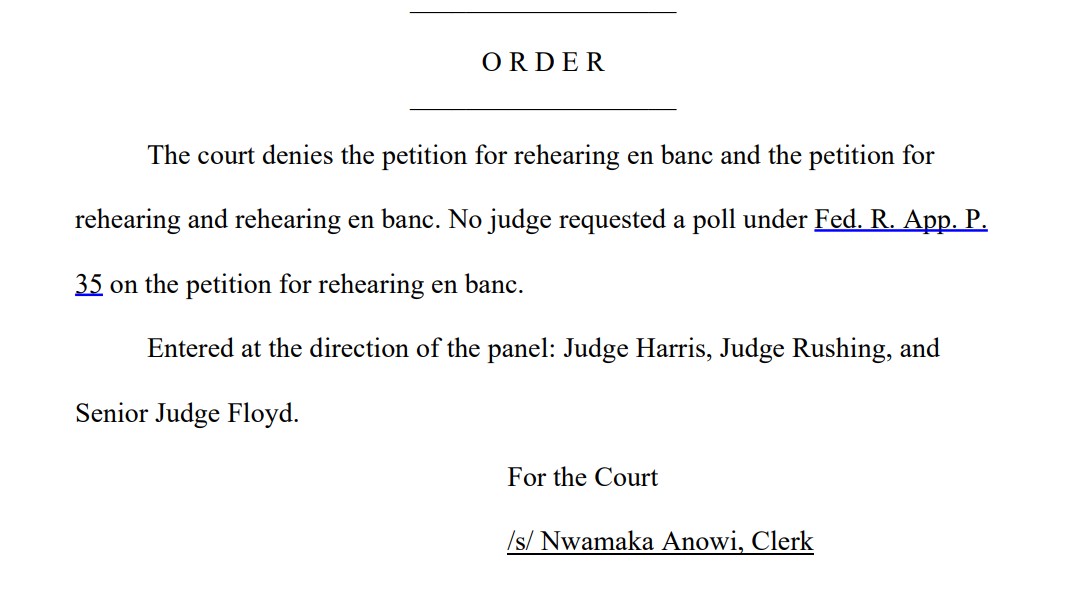 Sports leagues and their broadcasting partners across Europe believe that their piracy problems begin with the existence of illicit suppliers.
Sports leagues and their broadcasting partners across Europe believe that their piracy problems begin with the existence of illicit suppliers.
It follows that if those illicit suppliers can be prevented from reaching their subscribers, reasons for buying TV packages from the black market will be mostly eliminated and legal subscription sales will ensue.
As the legal owners of the rights in question, these corporate giants have the luxury to frame the issue however they choose. However, when the war on piracy begins to take a toll on those not even remotely involved, it raises the question of who has the authority to step in and where the threshold for intervention lies.
On Friday, a judge handling a copyright case concluded that since messaging platform Telegram had failed to help rightsholders identify the operators of certain Telegram channels, something needed to be done. Insisting that there was no other option available, the judge issued an order for Telegram to be blocked by ISPs throughout Spain.
The judge described the measure as “necessary” and “proportional” and in a few hours’ time, if not already, around eight million users of Telegram in Spain will have a chance to chime in with their opinions, but not via Telegram, obviously.
Update: March 25, 2024
:
Amid a huge backlash in Spain, including criticism of the decision and the government by opposition parties, the blocking order has been suspended. See update below.
Media Giants Want to Unmask Telegram Channel Operators
Existence of the order and some general details were revealed by
Telecinco
on Friday.
The publication reported that as part of a copyright complaint previously filed by anti-piracy group EGEDA, Mediaset España, Atresmedia, and Movistar Plus, the rightsholders had demanded information from Telegram that could help them identify the operators of piracy-linked Telegram channels.
Despite the involvement of the court, Telegram failed to respond; Judge Pedraz concluded that since the investigation would now take more time, in the interim Telegram would have to be blocked by ISPs throughout Spain.
Telegram has previously been blocked by Iran, China, and Pakistan, among others, but the addition of Spain came as a surprise. Expecting to find considerable unreported nuance, TorrentFreak tracked down the order; issued by Juzgado Central de Instrucción Número 5 and dated March 22, 2024, it begins with a section marked “Factual Background.”
Case Background as Reported in the Order
The order describes the present proceedings in connection with the “continued infringement of intellectual property rights,” carried out by “owners of various channels created on the Telegram social network,” and an ongoing investigation involving the prosecutor’s office.
In a report dated March 8, 2024, the prosecutor’s office requested a six-month extension of the investigation period. This followed an EGEDA request and a writ filed on behalf of rightsholders Telefónica Audiovisual Digital (TAD), Movistar+, and Movistar Plus+.
After detailing the rules concerning investigations and time limits, the Judge notes in the absence of an extension, the current investigation is set to expire on March 29, 2024, having run for the maximum 12 months allowed under
Article 324.1 LECrim
.
Request for Judicial Assistance
The order then turns to the corporate entity operated by Telegram in the British Virgin Islands and the letters rogatory (letters of request) sent by the Spanish court to the Virgin Islands seeking judicial assistance.
“For the successful completion of the investigation, it is necessary to carry out the proceedings contained in the rogatory commission sent to the Virgin Islands, but so far there has been no news of compliance with the aforementioned instrument of cooperation,” the order reads.
“Numerous diligence of investigation will be pending depending on the information that will be provided by the execution of the above-mentioned international rogatory commission. Therefore, the period of investigation should be extended for six months in order to carry out the pending proceedings.”
Information Required For a Private Criminal Prosecution
The order reveals that non-compliance with the international rogatory commission sent by the Judge to the Virgin Islands on July 28, 2023, has effectively brought the investigation to a halt. The information sought by Judge Pedraz is required to support a
private criminal prosecution
brought by the media companies, not the state.
Private prosecutions in criminal cases are favored by sports rightsholders in the UK; as the alleged victim, rightsholders conduct their own investigations, harvest their own evidence, then act as the prosecution in the same case. There are no restrictions on the amount of legal firepower they’re permitted to deploy, meaning that in most cases defendants face the best lawyers money can buy.
Lack of Cooperation from Virgin Islands
Whether this aspect of the request is known to Telegram isn’t clear from the order. Indeed, the order makes no comment on whether Virgin Islands authorities even passed on the request, raising the question of what Telegram knows, or even if it knows anything at all.
“Telegram was requested to inform about certain technical data that would allow the identification of the holders of the accounts used for the infringement of the intellectual property rights of the entities appearing as Private Prosecutor. The lack of collaboration of the authorities of the Virgin Islands, who are only requested to communicate with the managers of the social network TELEGRAM, leads to the adoption of the precautionary measures requested by the private prosecutors,” the order reads.
“This repeated commission of the crime against intellectual property rights justifies the adoption of the requested precautionary measures, since the principles of necessity, suitability, and proportionality are met. The requested precautionary measures are the only possible measures in view of the lack of collaboration of the Virgin Islands authorities. There is no other type of measure that could stop the reiteration of the facts denounced.”
From this statement it’s clear that the rightsholders requested a complete block of Telegram in Spain and the Judge considered that a reasonable request.
Blocking Millions of Telegram Users is Acceptable
“The measure is suitable because its execution could put an end to the infringement of intellectual property rights denounced to prevent access through the TELEGRAM network to the contents of the aforementioned rights. The measure is proportional to the seriousness of the conduct denounced and in this analysis is related to the necessity of the measure,” the order continues, with the legal justification (translated from Spanish) as presented below.
The ISPs instructed to carry out the blocks within three hours of receiving the order are:
Vodafone España, Orange Espagne, Orange España Virtual, MASMOVIL IBERCOM, Digi Spain Telecom, Telefónica España, Telefónica Móviles España, AVATEL TELECOM, ADAMO TELECOM IBERIA, AIRE NETWORKS DEL MEDITERRÁNEO, and PROCONO
.
The Telegram assets to be blocked are:
Telegram Web (https://web.telegram.org/k/), Telegram Messenger (https://telegram.org/), and Telegram Apps for Android and iOS.
It appears the rightsholders were well-prepared since they mandate the following:
Apps: disable and block the connection [IP addresses, protocols, ports and any other connection element], to suspend the operation of the ‘Telegram’ application (app) of the connections from Smartphone and/or Tablet of the Operators’ users who have the “Telegram” “app” installed on their devices, operated from any operating system (Android, iOs).
Blocking Telegram or Denying Access to Non-Infringing Users
Judge Pedraz frames these measures as the blocking of Telegram but the mechanism chosen clearly shows that Telegram can still reach Spanish ISPs but the blocks they’re required to put in place prevent Telegram users from accessing the platform. That’s especially the case in respect of the apps where interference is directed towards functionality of apps on users’ devices.
While some may dismiss this as semantics on the basis that blocking pirate sites operates similarly, Telegram is not a pirate site and most Spanish users of Telegram are not pirates.
Whereas it might be reasonable to assert that most Spanish visitors to The Pirate Bay do so to infringe and therefore have no legal basis to visit the site, most visitors to Telegram do not visit the platform to infringe. Even of those that do, only a tiny minority will visit the channels in question. Nevertheless, millions of innocent Telegram users will soon be prevented from going about their entirely legal business.
That raises the fundamental question of the nature of the scales used to weigh the competing interests in this case and, more fundamentally, who is actually being punished here; Telegram as claimed, or non-infringing Spanish users?
Three Days to Appeal, Including Weekend
“An appeal for reform may be filed against this order, within a period of three days, before this Central Preliminary Examining Court, and/or, if applicable, an appeal, in a single effect, before the Criminal Chamber of the National High Court,” the order concludes.
As far as we’re aware there’s no recent news to indicate an appeal. These types of cases have traditionally seen ISPs step in but since the major ISPs in Spain are either rightsholders in their own right or have a commercial interest in blocking going ahead, an appeal from that direction seems unlikely.
We’re currently unaware of any comment from Telegram but given the scale of the response versus the problem to be solved, this matter is likely to attract international attention and scrutiny. Common wisdom suggests that when an adversary is making a mistake, he should be allowed to do so without being interrupted, so we may hear from Telegram in due course.
Update: March 25, 2024
:
Amid a huge backlash in Spain, including criticism of the decision and the government by opposition parties, the blocking order has been suspended. National Court Judge Santiago Pedraz has requested a report from the General Information Commissioner’s Office (Comisaría General de Información) to provide data on the characteristics of Telegram and an assessment of the impact the measure could have if implemented.
A statement from the Podomos party criticized the government for failing to act in the face of “genuine censorship” at the hands of the “oligopoly of complainant communication companies” whose interests are “taking precedence” over the “freedoms of many citizens.”
Update:
Official statement
from the communications office of the National Court (translated from Spanish)
The judge of the National Court Santiago Pedraz issued an order this Monday in which he agreed, prior to the temporary suspension of the resources associated with Telegram, to request a report from the General Information Commissioner’s Office on the Telegram platform. The magistrate requests information about its characteristics as well as the impact that the temporary suspension, that he agreed to in an order last Friday and whose execution remains suspended, may have on users.
In the aforementioned order, the magistrate ordered the telecommunications and Internet access operators to temporarily suspend Telegram in the framework of a procedure against the owners of various channels created on the social network, for continued violations of intellectual property rights.
In his resolution, Pedraz explained that the measure has legal support contemplated in article 13.2 of the LECrim: “In the investigation of crimes committed through the internet, telephone or any other information or communication technology, the court may agree, as first steps, ex officio or at the request of a party, precautionary measures consisting of the provisional removal of illicit content, the provisional interruption of the services offered by said content, or the provisional blocking of both when they are located in a foreign country.”
From:
TF
, for the latest news on copyright battles, piracy and more.
chevron_right
 Online piracy continues to present massive challenges for the entertainment industries.
Online piracy continues to present massive challenges for the entertainment industries.
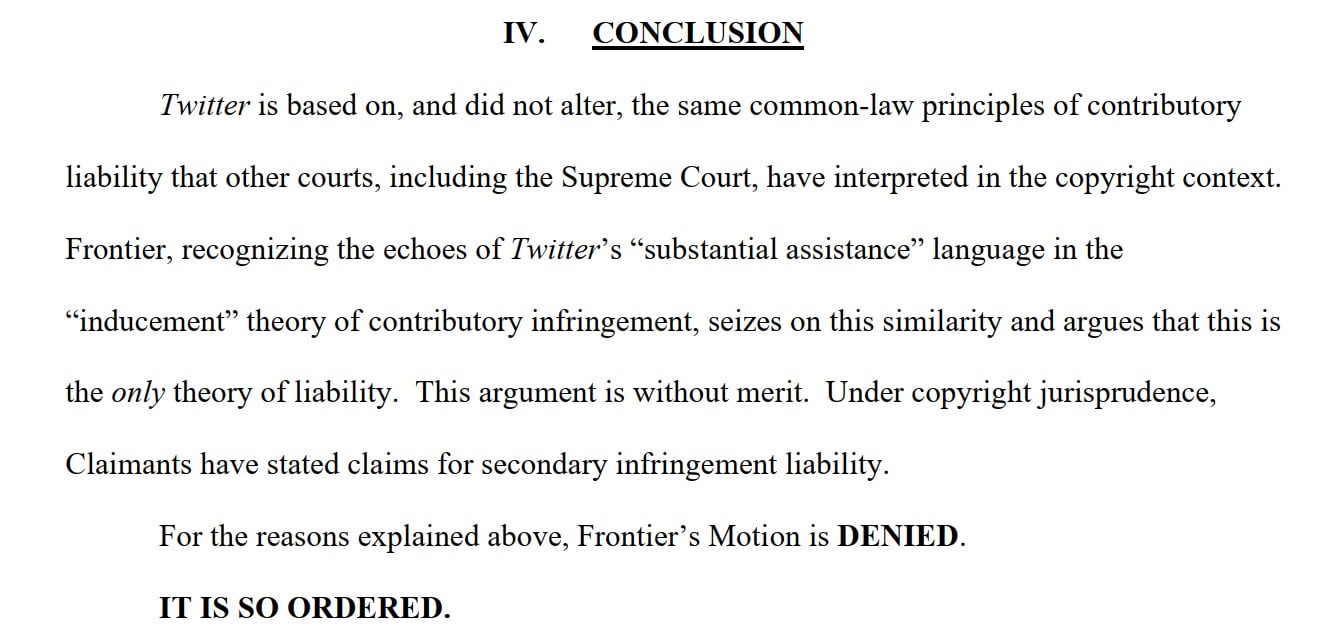
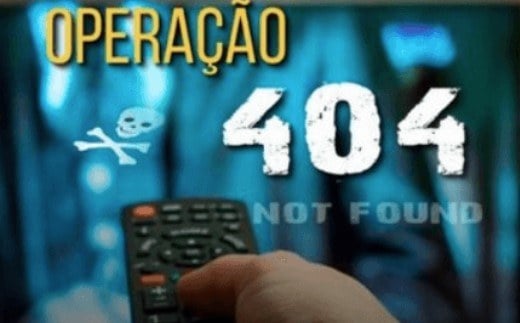 In the
In the
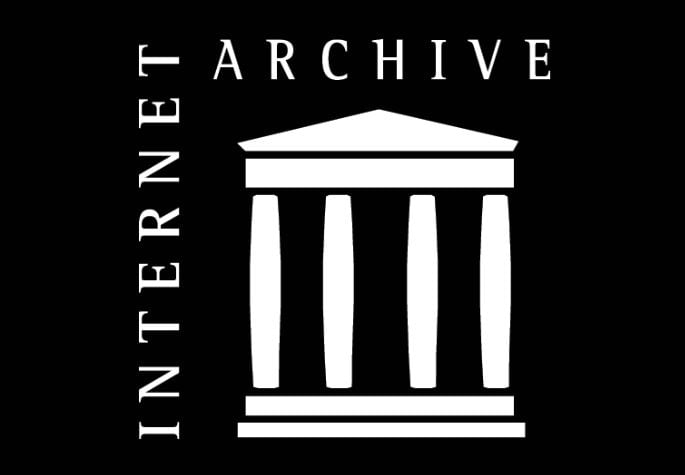 The
The
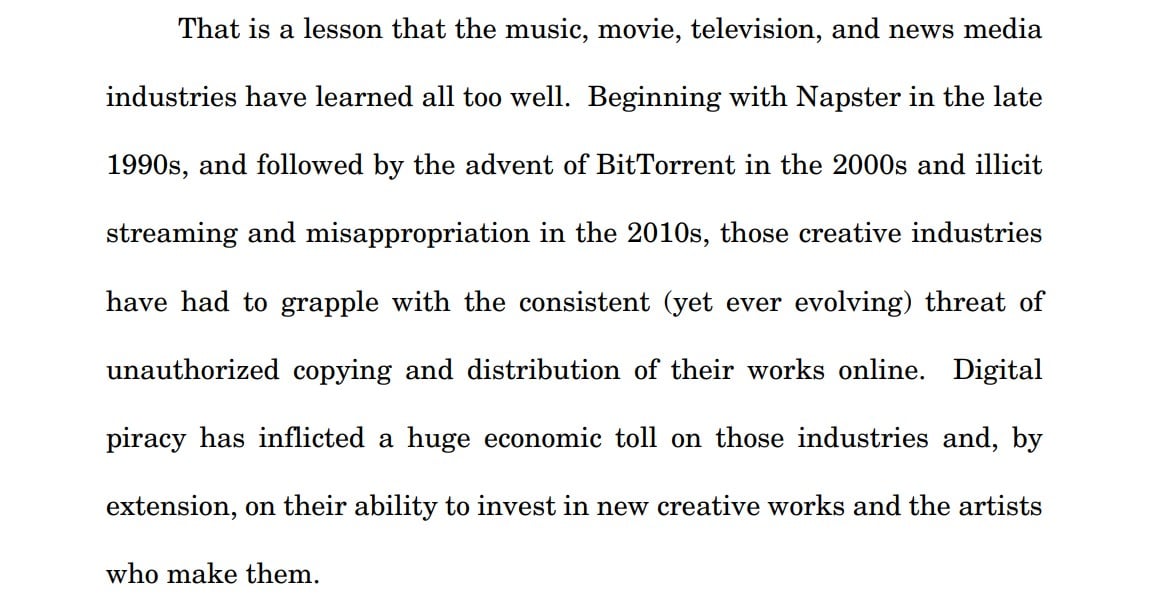

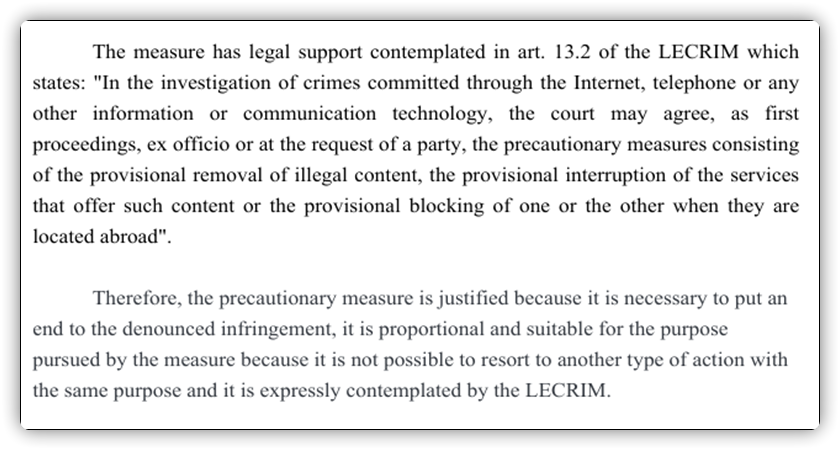
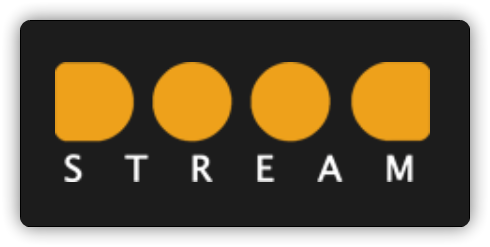
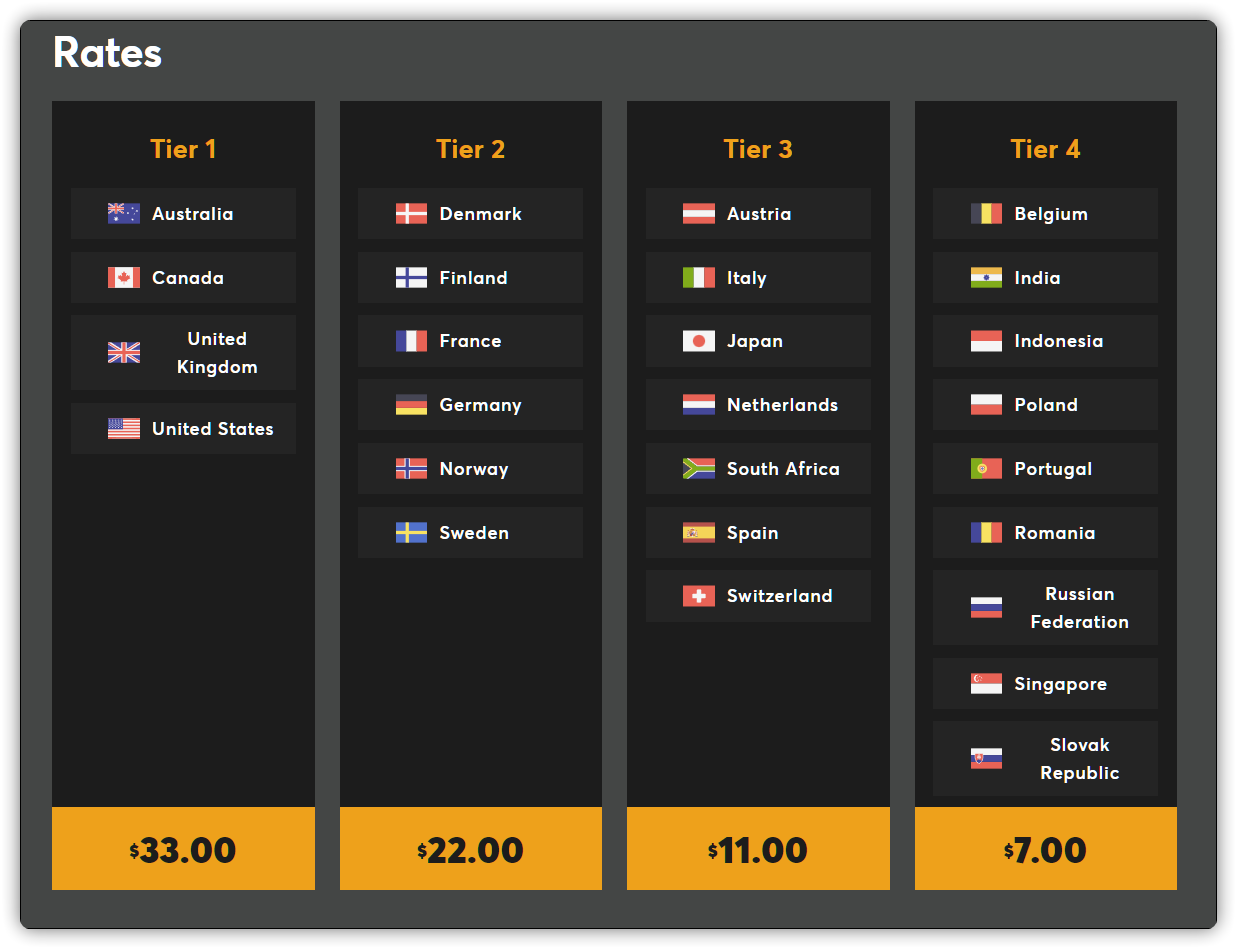
 Late 2019, Internet provider Cox Communications lost its legal battle against a group of major record labels, including Sony and Universal.
Late 2019, Internet provider Cox Communications lost its legal battle against a group of major record labels, including Sony and Universal.
